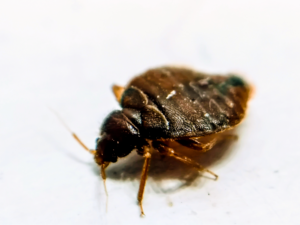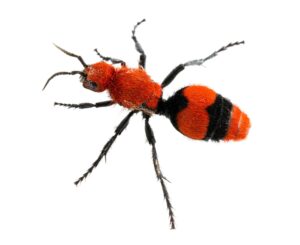Home / Blog / Spiders / Brown Recluse vs. House Spider: A Comparison Guide
Brown Recluse vs. House Spider: A Comparison Guide

Scientifically reviewed by Rachel Maldonado
-Published on June 10, 2024
-Updated on August 23, 2024
Brown Recluse vs. House Spider: A Comparison Guide
You flip on the light in your basement, and there it is – a spider. Your first inclination is to panic, but is it a harmless house spider or the notorious brown recluse?
Knowing the difference can make a world of difference for your peace of mind and safety, but it’s not always easy to tell the two apart.
This guide will help you navigate the often confusing world of these two common spiders, giving you the knowledge you need to identify and deal with them effectively (and, hopefully, to set your mind at ease).
What Are These Two Spiders?
The brown recluse spider, also known as Loxosceles reclusa, is infamous for its venomous bite. These spiders are typically found in the central and southern United States. They prefer dark, undisturbed places like basements, attics, and closets.
Common house spiders, usually from the genus Parasteatoda, tend to be less intimidating. They’re found worldwide and often coexist peacefully with humans. These spiders tend to hang out in corners, behind furniture, and other spots where they can catch insects without being disturbed.
Key Differences in Identification
Here are some tips to help you tell these spider species apart:
- Brown Recluse: Typically 0.5 to 1 inch in size. Their color ranges from light to dark brown, often with a violin-shaped mark on the back of their head portion, or cephalothorax.
- House Spider: Usually smaller, around 0.2 to 0.4 inches. Their color can vary, but they are often yellowish-brown with a somewhat muddled pattern on their abdomen.
Another telltale difference that you can use for identification lies in the webs. In general, brown recluse spiders spin irregular, messy webs that are often found close to the ground. House spiders, however, create funnel-shaped webs in higher locations, like ceiling corners or window frames.
Behavior: What They Do and Why
Another way to tell brown recluse and house spiders apart is in their behaviors.
True to its name, the brown recluse is…well, reclusive! It is not aggressive and, despite its formidable reputation, really only bites when it’s disturbed. It is not a mankiller by any means; it prefers to dine on small insects and other spiders, using its powerful venom to immobilize its prey.
House spiders are more social and likely to be seen out in the open. They’re not at all harmful to humans, and while they technically can bite, the bite itself isn’t very painful or venomous. These spiders eat a variety of small insects and can be quite beneficial to have in your home, since they can get rid of all kinds of tiny pests.
The Bite: What Happens if You’re Bitten?
A primary concern for anyone dealing with spiders in their home, whether they’re brown recluse spiders, house spiders, or anything else, is what happens if you’re bitten. This is another key difference between these two spider species.
The brown recluse spider’s bite, though not a common occurrence, is its most feared characteristic. The venom can cause severe reactions, including necrotic lesions, which are painful and slow to heal. The most common symptoms include:
- Redness and swelling
- Severe pain at the bite site
- Fever and chills
- Nausea
If you suspect a brown recluse bite, you need to seek medical attention immediately.
A house spider’s bite is much less concerning. While it might cause minor irritation, it’s not dangerous. Symptoms are usually limited to:
- Mild redness
- Slight swelling
- Itching
Prevention: Keeping Spiders Out
It’s probably safe to say that it doesn’t matter whether you’re dealing with a brown recluse spider or a house spider – you likely don’t want either one in your home!
If you’re worried about spiders, there are a few simple tips you can follow to prevent them, including:
- Declutter: Keep storage areas organized and free of clutter where spiders can hide.
- Seal Cracks: Close any gaps in walls or windows to prevent spiders from entering.
- Regular Cleaning: Frequently clean areas like basements and attics to disrupt any potential habitats. Spiders love dirt, debris, and as mentioned earlier, clutter, so keeping things tidy will go a long way.
- Dust and Vacuum Often: Aside from cleaning the basement and attic, regularly dust and vacuum the rest of your home to remove webs and discourage spiders from setting up shop.
- Food Storage: Keep food sealed to avoid attracting insects, which in turn attract spiders.
- Use Essential Oils: Though the jury is still out on whether these are totally effective, peppermint and eucalyptus oils may both act as natural repellents.
Sometimes, DIY methods aren’t enough. If you’re dealing with a significant infestation or suspect you have brown recluse spiders, it’s time to call in the professionals. Pest control experts can identify the type of spider and implement the most effective treatment plans to keep your home safe in the long-term.
Take Back Control with Hawx Pest Control
With this guide, you now have the tools to identify and manage common household spiders. Understanding the differences between brown recluse spiders and house spiders can help you manage your household pests more effectively (and hopefully, with a bit more confidence!).
But when it comes to making sure your home is truly spider-free, there’s no substitute for professional help.
Join our family of satisfied customers at Hawx Pest Control Virginia Beach VA. Our team of experts is dedicated to providing top-notch service, ensuring your home stays safe and comfortable. Contact us today to schedule an inspection and take the first step toward a pest-free home.
Remember, your peace of mind is just a call away. Let Hawx Pest Control handle the creepy crawlies so you can relax and enjoy your home.
Related Articles
Visit our blog to learn more.
→






